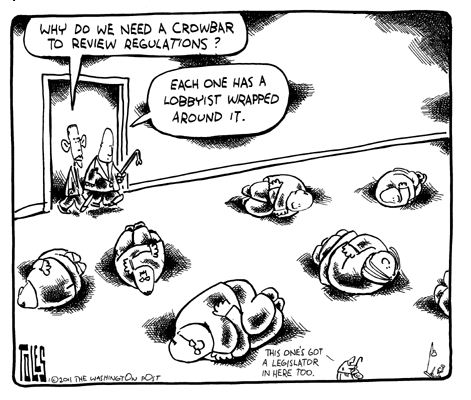 The folks over at RegBlog are running a series of essays on “Rooting Out Regulatory Capture,” a problem that I’ve spent a fair amount of time discussing here and elsewhere in the past. (See, most notably, my compendium on, “Regulatory Capture: What the Experts Have Found.”) The first major contribution in the RegBlog series is from Sen. Elizabeth Warren (D-MA) and it is entitled, “Corporate Capture of the Rulemaking Process.”
The folks over at RegBlog are running a series of essays on “Rooting Out Regulatory Capture,” a problem that I’ve spent a fair amount of time discussing here and elsewhere in the past. (See, most notably, my compendium on, “Regulatory Capture: What the Experts Have Found.”) The first major contribution in the RegBlog series is from Sen. Elizabeth Warren (D-MA) and it is entitled, “Corporate Capture of the Rulemaking Process.”
Sen. Warren makes many interesting points about the dangers of regulatory capture, but the heart of her argument about how to deal with the problem can basically be summarized as ‘Let’s Build a Better Breed of Bureaucrat and Give Them More Money.’ In her own words, she says we should “limit opportunities for ‘cultural’ capture'” of government officials and also “give agencies the money that they need to do their jobs.”
It may sound good in theory, but I’m always a bit perplexed by that argument because the implicit claims here are that:
(a) the regulatory officials of the past were somehow less noble-minded and more open to corruption than some hypothetical better breed of bureaucrat that is out there waiting to be found and put into office; and
(b) that the regulatory agencies of the past were somehow starved for resources and lacked “the money that they need to do their jobs.”
Neither of these assumptions is true and yet those arguments seem to animate most of the reform proposals set forth by progressive politicians and scholars for how to deal with the problem of capture. Continue reading →




 One of my favorite recurring themes here on TLF is the definitional dispute/clarification. We point out where a term has been used in many different ways and explain the positives and negatives of the various behaviors described by that term. I just did this with
One of my favorite recurring themes here on TLF is the definitional dispute/clarification. We point out where a term has been used in many different ways and explain the positives and negatives of the various behaviors described by that term. I just did this with  The Technology Liberation Front is the tech policy blog dedicated to keeping politicians' hands off the 'net and everything else related to technology.
The Technology Liberation Front is the tech policy blog dedicated to keeping politicians' hands off the 'net and everything else related to technology.